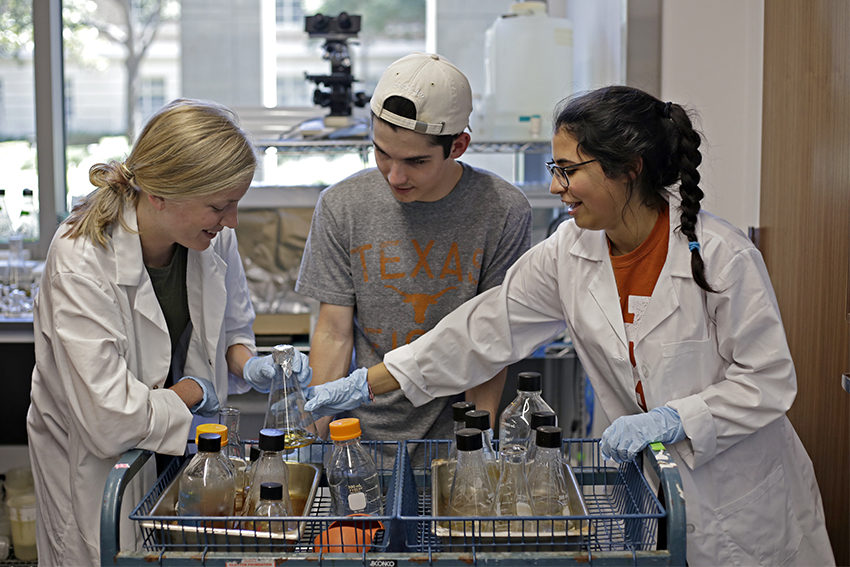For incoming freshmen, UT’s Freshman Research Initiative gives them the chance to spend time in a real research lab, opt out of required introductory lab courses and join a community.
Founded in 2005, FRI is now the nation’s largest university undergraduate research program. Students applying to the FRI program list their top five choices of research groups they would be interested in joining, called “streams,” and the program assigns them one of their choices.
“(FRI) gives students access to research by allowing students more freedom to pursue their own interests,” said Jo Holley, research educator for the “Microorganisms in Bees and Other Insects” stream, aka “Bugs in Bugs.” “They get to learn how to do higher-order skills like problem-solving and creation, rather than rote-learning memorization.”
The “Bugs in Bugs” stream focuses on the interaction between bacteria and insects, said Holley, a clinical assistant professor. Students in her stream start on their own projects early on and thus have more opportunity to specialize in their own field of interest.
“You don’t necessarily have to be in a stream that mimics your major,” said Ryan Bailey, a biology sophomore in the “Microbe Hackers” stream. “You kind of learn how you can apply your own skills and build them. We have (coders, photographers and graphic designers).”
FRI’s research educators are given a lot of freedom in managing their streams, so there is considerable variation from stream to stream, Holley said. Whereas her stream emphasizes creating original project ideas and analyzing current scientific literature, Holley said other streams can be more regulated and guided.
“For labs that are similar topics (such as the many genetics streams), the commitments and the environments will be very different,” said Eleanor Young, a biology sophomore in the “Microbe Hackers” stream.
The effects of FRI have shown many benefits to students across programs and majors, Holley said. For example, Holley said their research shows that students who participate in FRI are more likely to graduate and persist in STEM.
“It’s more time commitment but it’s also more chill,” said Bibiana Toro, a biology sophomore in the “Microbe Hackers” stream. “You’re not drowned by GPA. … That’s not FRI. You’re just worried about your bacteria.”
FRI streams also allow for more intimate relationships with both fellow students and instructors, Holley said. FRI labs often only have a few dozen students and then may even split up into smaller groups.
“It allows you to meet people,” Toro said. “FRI is where people get access to higher labs. It’s like a springboard.
The intimacy of a stream can give students more understanding and motivation than a introductory lab course would and may even lead to letters of recommendation, Bailey said.
“You meet people with similar plans,” Young said. “There is a community aspect to it.”
Many students don’t get their first choice of streams but still end up loving their research, Young added.
“Even if you’re pre-med and you think for sure that you don’t want to go into research, go into FRI,” said Melody Keith, a biochemistry senior who was previously in the “Luminators” stream. “A lot of people will actually do research and then end up loving it. That’s what I did.”















